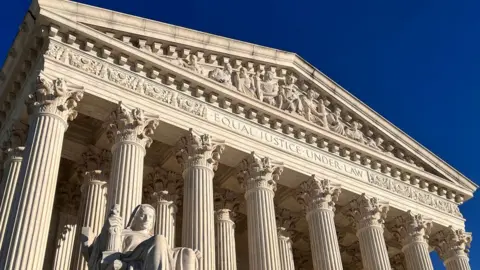Mifepristone: Supreme Court keeps abortion pill available for now
 Getty Images
Getty ImagesThe US Supreme Court has temporarily halted a ruling that set limits on access to the abortion pill mifepristone.
The pause ordered by Justice Samuel Alito is the latest move in an ongoing legal battle over access to the drug.
Last week, a Texas court had ordered the drug to be pulled off the market.
A lower appeals court responded to the Texas ruling by keeping the drug available, but with conditions.
But on Friday, Justice Alito, a conservative, halted the restrictions until right before midnight on 19 April, after the Biden administration filed an emergency appeal to the Supreme Court to restore access to the drug.
The delay will give justices more time to review the case. Justice Alito asked that additional briefing material be filed by 18 April.
Mifepristone is used in more than half of all US abortions. Experts say the legal fight about its safety will have far-reaching implications for both abortion access and drug regulation in the United States.
The abortion pill was first approved by the US Food and Drug Administration (FDA) more than 20 years ago. It is part of a two-drug regimen that induces abortions - it effectively stops the pregnancy, while the second drug, misoprostol, empties the uterus.
In reaction to the Supreme Court's decision, the White House Press Secretary Karine Jean-Pierre said in a statement that "the president and his administration continue to stand by FDA's evidence-based approval of mifepristone".
"The stakes of this fight could not be higher in the face of ongoing attacks on women's health," she said."
On 7 April, Texas court Judge Matthew Kacsmaryk ruled the FDA had violated federal rules that allowed for the accelerated approval of some drugs, and had erred in its scientific assessment of the abortion pill.
A federal appeals court in New Orleans on Wednesday put a hold on the Texas ruling, but imposed additional limits on the drug that include requiring it to be taken in the presence of a physician.
Other restrictions included barring patients from receiving the pill by post, and shortening the window for mifepristone's approved use from up to 10 weeks of pregnancy to seven. Those rules were set to take effect on Saturday.
In response, the US Department of Justice (DoJ) asked the country's top court to strike down the limitations, writing in its appeal that the Texas ruling would lead to "regulatory chaos" for the approval of drugs.
A lawyer for the Alliance Defending Freedom, a conservative Christian legal advocacy group that filed the initial lawsuit against the FDA, said the Supreme Court's decision on Friday was "standard operating procedure" to give justices time to review the arguments before them.
"We look forward to explaining why the FDA has not met its heavy burden to pause the parts of the district court's decision that restore the critical safeguards for women and girls," lawyer Erin Hawley said in a statement.
Danco Laboratories, the drug's manufacturer, had also asked the Supreme Court to step in.
"The lack of emergency relief from this Court will also harm women, the healthcare system, the pharmaceutical industry, states' sovereignty interests, and the separation-of-powers," said Danco attorney Jessica Ellsworth.
